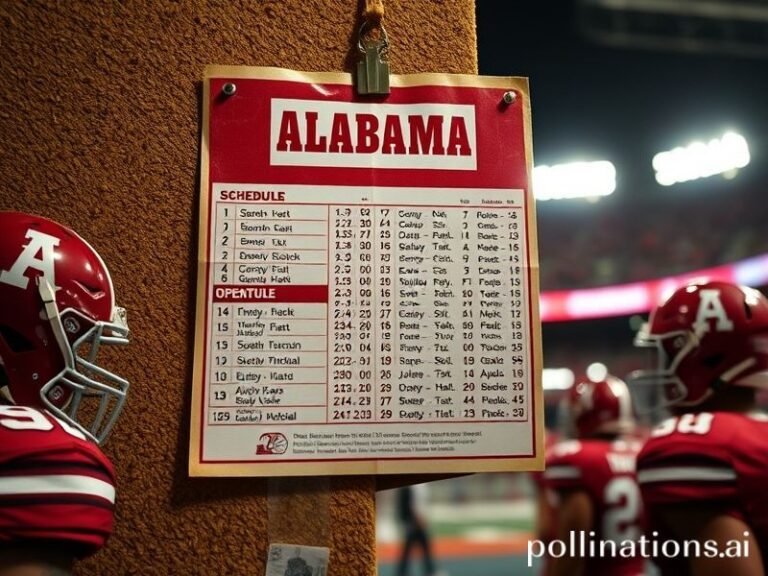Gridiron Globetrotters: How a Small Southern Football Game Became the World’s Most Overanalyzed Micro-Economy
A Palmetto Punch-Up on the World’s Margins: SC State vs South Florida through the Bleary Eyes of the Planet
By L. Vargas, Dave’s Locker Global Affairs Desk
Picture, if you will, an over-air-conditioned conference room on the 38th floor of some soulless tower in Dubai. A Lebanese risk consultant, a Ghanaian cocoa broker, and a Singaporean fintech prodigy hunch over lukewarm coffee, scrolling past oil futures and the latest AI-generated pop star. Buried beneath the doom-scroll is tonight’s headline: “SC State Bulldogs at South Florida Bulls, Raymond James Stadium, Tampa.” None of them went to either school; none could locate Orangeburg on a map without GPS. Yet the line on the game flickers across their Bloomberg terminal like a distress flare, because in 2024 even a midweek September tilt between a 1–2 FCS outfit and a Group-of-Five aspirant is now a data point in the planetary fever chart.
To the uninitiated, this is merely American college football—an amateur enterprise so marinated in cash it makes the Bundesliga look like a church raffle. Globally, though, it’s a Rorschach test. Europeans see unpaid labor colliding with 18-wheeler TV contracts. Asians track the over/under like a currency peg. Africans note with weary recognition that the marching band has nicer buses than half the continent’s ministries of health. Australians just mutter, “At least our rugby lads admit they’re professionals.”
Tonight’s match is nominally about South Florida trying to pad its résumé for some future “access bowl,” and SC State collecting a six-figure guarantee check—colloquially known as the “rent-a-win.” The money will keep the Bulldogs’ lights on for another semester, which is more than you can say for the Lebanese power grid. Meanwhile, USF’s athletic department is leveraged like a Turkish construction firm, praying that expanded playoffs and streaming rights will cover the note on their new IPF (indoor practice facility, for civilians). If the stadium looks a little empty, blame global inflation: the same $10 beer that once bought a decent falafel in Berlin now barely covers a bottle of water in Reykjavik.
On the field, the geopolitics are miniature but telling. SC State’s quarterback, a lithe sophomore from Sumter, grew up watching grainy YouTube clips of Patrick Mahomes because NFL Game Pass costs more than his mom’s car note. Across the line, USF’s defensive end—an Aussie import who thought “gridiron” was a cooking utensil until age 14—now dreams of the CFL draft and a Canadian passport. Their collision will be live-streamed in 42 countries, most of which just want to see if the underdog covers the 27-point spread. In Manila, a call-center shift supervisor has parlayed his lunch break into a three-leg Same Game Parlay; if SC State scores a meaningless late touchdown, he can finally replace the busted inverter on his family’s rooftop solar rig.
Halftime brings the obligatory military flyover—two F-16s burning fuel that costs more per gallon than Moldova’s daily wine exports. The PA announcer thanks “our partners at CENTCOM,” which is ironic because half the roster couldn’t spell CENTCOM without Siri. Somewhere in Tallinn, a cyber-ops analyst logs the stadium Wi-Fi as a low-priority vulnerability; she’s seen more sophisticated networks in North Korean karaoke bars.
By the fourth quarter, the outcome has long been decided—USF by four touchdowns, the Atlanta crooner in the post-game interview calls it “a business trip” with the sincerity of a crypto influencer. SC State’s coach, a man who’s watched entire position groups transfer out via Instagram DMs, smiles the tight smile of a man calculating how many recruiting dinners this check will cover before the NCAA changes the rules again.
And so the world spins: the Lebanese consultant pockets his arbitrage, the Ghanaian broker hedges cocoa against a hurricane that might never come, the Singaporean prodigy codes a micro-betting app that will let Jakarta street vendors wager on the next play in real time. Somewhere in the cosmic ledger, a football game between two American schools nobody outside the 813 and 803 area codes truly care about has generated more economic activity than a small Pacific atoll.
Which is, of course, the bleakest joke of all: we’ve built a planet where a scrimmage in a taxpayer-subsidized coliseum can move more money than most nations see in a fiscal quarter. The final whistle blows, the lights dim, and the Bulls’ mascot rides off on an inflatable pirate ship. In the distance, thunder—either the stadium pyrotechnics or another climate-change superstorm, who can tell anymore—rumbles like the gods clearing their throats.
The Bulldogs board their charter, pockets marginally heavier, dignity largely intact. The Bulls pose for selfies, dreaming of an AAC title and a future where the playoff committee remembers they exist. And on every continent, the planet shrugs and reloads the feed, because tomorrow there will be another game, another line, another desperate reason to believe that somewhere, somehow, the numbers might finally add up.







